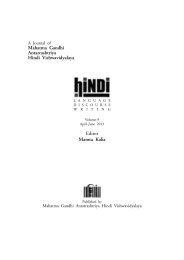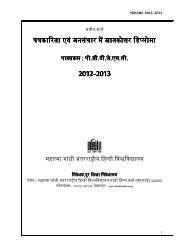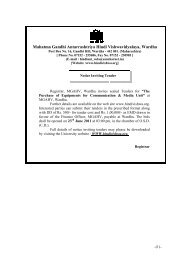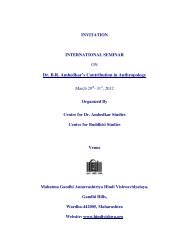Mamta Kalia
Mamta Kalia
Mamta Kalia
Create successful ePaper yourself
Turn your PDF publications into a flip-book with our unique Google optimized e-Paper software.
catastrophe and progress together’. He<br />
again (1991) talks of a new concept of<br />
‘cognitive mapping’, that is a code word<br />
for ‘class consciousness’- thus he shares<br />
Marxist representation of history as a<br />
story of class struggles, hence issues<br />
of gender, race and ethnicity are not<br />
significant in his theorizing. He borrows<br />
conception of semi-autonomy from<br />
Althusser, notion of schizophrenia from<br />
Lacan, Deleuge & Guattari, concepts of<br />
‘ intensities’ and ‘sublime’ from Lyotard,<br />
idea of ‘simulacrum’ from Deleuge and<br />
Baudrillard, and idea of ‘homeopathic’<br />
strategy ( a version of ‘fatal’ strategies)<br />
from Baudrillard. He rightly says that<br />
under post-modernism feelings become<br />
‘intensities’ (Lyotard) in that these“ are<br />
now free-floating and impersonal and<br />
tend to be dominated by a peculiar kind<br />
of euphoria”.<br />
Later Jameson followed E. Mandel’s<br />
‘Late Capitalism’ (1978) regarding<br />
periodisation: the first period, dominated<br />
by market capitalism and by its aesthetic<br />
corollary ‘realism’; second period of<br />
monopoly or imperialist capitalism that<br />
gave rise to modernism; third period<br />
(current one) of late capitalism that<br />
corresponds to post-modern aestheticthere<br />
is expansion of capital into hitherto<br />
uncommodified areas, especially in the<br />
west late capitalism has penetrated and<br />
commodified representation (media)<br />
itself. To him, current technologycomputer,<br />
TV set and other ‘ machines<br />
of reproduction’ rather than productionno<br />
longer possesses ‘ the capacity for<br />
representation’ that charaterised the<br />
technologies of earlier stages of<br />
capitalism. But disagreeing with him, Mike<br />
Davis is of the view that modernism,<br />
at least in architecture, remained the<br />
functional aesthetic of late capitalism.<br />
Second, Jameson’s focus on class struggle<br />
as the centre of political struggle- working<br />
class as the agent par excellence of<br />
progressive change- has not been proved<br />
true in many situations ranging from<br />
factories to nation-states going beyond<br />
class struggle. Third, he has not given<br />
due focus on feminist, ethnic and<br />
ecological politics that has been of<br />
primary significance in both developed<br />
and developing countries.<br />
J. Derrida talks of ‘difference’<br />
‘decentering’ and ‘deconstruction’ as there<br />
is no universal and final truth. Hence<br />
a text has several interpretations,<br />
meanings, by the readers, independent<br />
of author’s intention- thus there is ‘death<br />
of author’, as interpretation by the reader<br />
is a different species of production.<br />
Therefore, there are multiple local<br />
possibilities, no absolute, universal,<br />
objective, permanent, homogenous and<br />
single possibility. Second, knowledge goes<br />
beyond the parameters of scientism<br />
(western science and technology) as there<br />
are indigenous narratives (stories and<br />
fables invented by people to give meaning<br />
and significance to their everyday life<br />
world) that exist in local, personal and<br />
social contexts. Derrida rejects<br />
metaphysical premises- the transcendent<br />
signifier – upon which empiricism is built.<br />
April-June 2010 :: 79

















